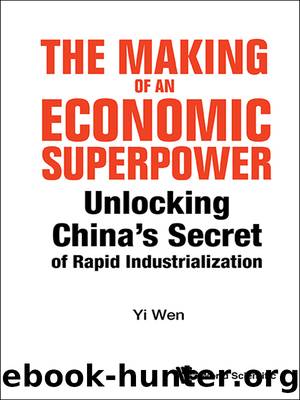The Making of an Economic Superpower: Unlocking China's Secret of Rapid Industrialization by Yi Wen

Author:Yi Wen [Wen, Yi]
Language: eng
Format: epub
Tags: Business & Economics, Development, Economic Development, Political Science, Political Economy, Economics, General, History, Social History
ISBN: 9789814733748
Google: CF-2DAAAQBAJ
Goodreads: 28350091
Publisher: World Scientific
Published: 2016-05-13T00:00:00+00:00
1 In addition to Gordon Changâs (2001) popular book, The Coming Collapse of China, also see James Gorrie (2013), The China Crisis: How Chinaâs Economic Collapse Will Lead to a Global Depression, and Peter Navarro and Greg Autry (2011), The Death by China: Confronting the Dragon â A Global Call to Action, among countless other China-bashing books and articles on China. Such widespread pessimistic and negative views on China can hardly be blamed given the Western populationâs ignorance on economic history and on the mainstream economistsâ failure to explain the industrial revolution as well as the powerful influence of the institutional theories. Four decades ago, President Richard Nixon himself once mused after visiting China in the early 1970s, âWell, you can just stop and think of what could happen if anybody with a decent system of government got control of that mainland. Good God ⦠Thereâd be no power in the world that could even â I mean, you put 800 million Chinese to work under a decent system ⦠and they will be the leaders of the worldâ (http://www.newsweek.com/henry-kissingers-prescription-china-67555). Todayâs communist party in China put 1.3 billion Chinese to work under a âflawedâ and âlousyâ system objected by the institutional theorists (Acemoglu and Robinson, 2012), while Russian, by far a much formidable economic force before the 1980s, has passed entirely from the scene after blindly adopting the neoliberalism ideology and Shock Therapy for economic and political reform.
2 See, e.g., https://www.youtube.com/watch?v=doMXl89Lur8.
3 Lant Pritchett and Lawrence H. Summers, 2014, âAsiaphoria Meets Regression to the Mean.â NBER Working Paper No. 20573 (http://www.nber.org/papers/w20573).
4 Arguments based on statistics can be misleading, however: Statistically speaking, for example, the probability of the Industrial Revolution was zero in late 18th century England. Even today, 250 years after the British Industrial Revolution, pure statistics still teach us nothing about the nature and cause of the Industrial Revolution.
5 Although China has not yet reached and crossed through the middle-income trap, our analysis suggests that China will be able to overcome the middle-income trap if it can successfully finish its second industrial revolution â which looks extremely likely in the next 10â20 years despite all the âgrowing painsâ (Tian Zhuâs commentary shares similar views on this issue, see http://www.guancha.cn/ZhuTian/2014_10_17_274362.shtml.) The most important task of the second industrial revolution is to create the market base, distribution networks, and supply chains to support the technology of âmass-producing the means of mass production.â As will be discussed in detail in Chapters 5 and 6, signs of successful completion of the second industrial revolution include the completion of agricultural mechanization (modernization) and financial industrial takeoff (financial capitalism). Such a society is then ready to enter a welfare state or post-industrial stage.
6 This may explain the puzzle of the âmiddle-income trap.â
7 After all, energy and locomotive devices, and infrastructure are merely the means of production instead of the goal of production. So the entire modern roundabout industrial structure is erected on the foundation of the final demand for consumption goods.
8 Through international trade, an industrialized
Download
This site does not store any files on its server. We only index and link to content provided by other sites. Please contact the content providers to delete copyright contents if any and email us, we'll remove relevant links or contents immediately.
Harry Potter and the Goblet Of Fire by J.K. Rowling(3023)
Never by Ken Follett(2869)
Shadow of Night by Deborah Harkness(2709)
Ogilvy on Advertising by David Ogilvy(2677)
Zero to IPO: Over $1 Trillion of Actionable Advice from the World's Most Successful Entrepreneurs by Frederic Kerrest(2373)
The Man Who Died Twice by Richard Osman(2289)
Machine Learning at Scale with H2O by Gregory Keys | David Whiting(2263)
Book of Life by Deborah Harkness(2258)
How Proust Can Change Your Life by Alain De Botton(2255)
My Brilliant Friend by Elena Ferrante(2217)
0041152001443424520 .pdf by Unknown(2213)
The Tipping Point by Malcolm Gladwell(2198)
How to Pay Zero Taxes, 2018 by Jeff A. Schnepper(2094)
Will by Will Smith(2032)
Purple Hibiscus by Chimamanda Ngozi Adichie(1977)
Hooked: A Dark, Contemporary Romance (Never After Series) by Emily McIntire(1932)
Borders by unknow(1779)
Rationality by Steven Pinker(1759)
Daughter of Smoke and Bone by Laini Taylor(1737)
